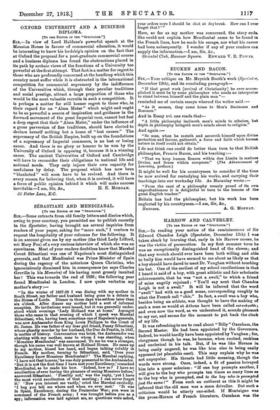El7CKEN AND BACON.
[To Tat EDITOR OF THE "SPECTATOR."] SIR,—Your critique on Mr. Meyrick Booth's work (Spectator, December 13th), and its concluding paragraph— "If that great work [revival of Christianity] be ever accom- plished it must be by some philosopher who needs no interpreter to stand between himself and the plain man "— reminded me of certain essays whereof the writer said " AB it seemes, they come home to Men's Business° and Bosomes."
And in Essay xvi. one reads that— "A little philosophy inclineth men's minds to atheism, but depth in philosophy bringeth men's minds about to religion."
And again :— "So man, when he resteth and assureth himself upon divine protection and favour, gatheroth a force and faith which human nature in itself could not obtain."
I do not think one could do better than turn to that British philosopher, Francis Bacon, and his teaching :— "That we keep human Reason within due Limits in matters Divine, and Sense within compasse." (The Advancement of Learning, preface.) It might be well for his countrymen to consider if the time be now arrived for restudying his works, and carrying their teachings into our workaday life. As Macaulay wrote :— "From the cant of a philosophy meanly proud of its own unprofitableness it is delightful to turn to the lessons of the great English teacher."
Britain has had the philosopher, but his work has been neglected by his countrymen.—I am, Sir, &c.,


































 Previous page
Previous page